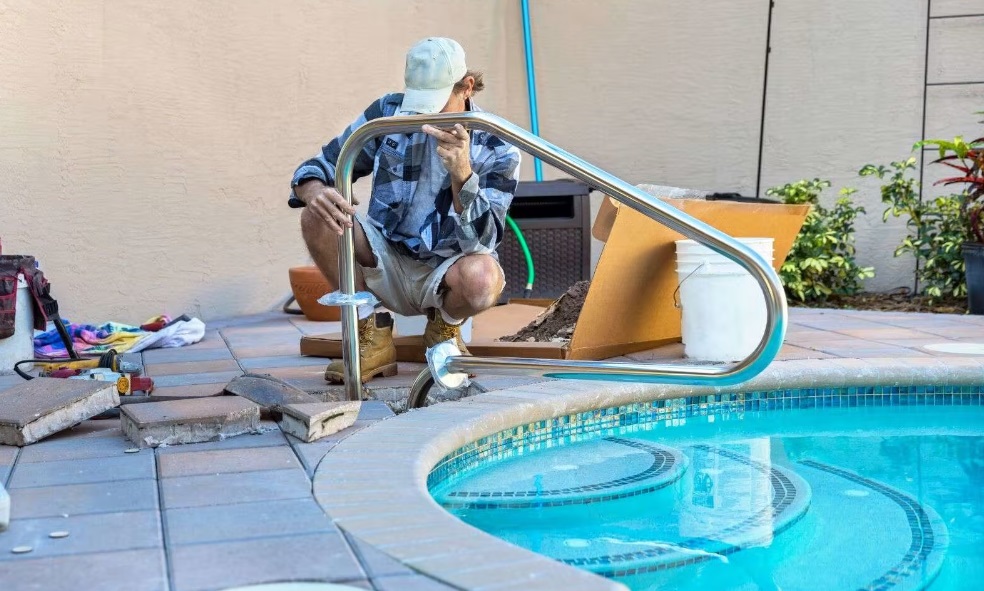
Commercial pool remodeling comprehensive project aimed at renovating or improving
Commercial pool remodeling is a comprehensive project aimed at renovating or improving a commercial swimming pool to enhance its appearance, functionality, safety, and efficiency. Here are some important considerations for a successful commercial pool remodeling project:
-
Assessment and Planning:
- Start by conducting a thorough assessment of the current pool, including its structure, plumbing, equipment, and aesthetics. Determine the specific areas that require attention.
- Develop a detailed project plan that outlines your budget, goals, timeline, and the scope of work. Collaborate with pool designers, architects, and contractors to create a comprehensive plan.
-
Budget:
- Establish a clear budget for the remodeling project. Consider not only the construction costs but also long-term operational expenses and potential cost savings through energy-efficient upgrades.
-
Design and Aesthetics:
- Decide on the design and aesthetics you want to achieve with the remodel. Consider the pool’s shape, size, surface materials (plaster, tile, aggregate), and any decorative elements like water features, lighting, and landscaping.
-
Structural Repairs:
- Prioritize any structural repairs or renovations needed to address safety concerns and extend the pool’s lifespan. Repair or reinforce the pool shell, addressing cracks, leaks, and drainage issues.
-
Compliance and Codes:
- Ensure that the renovation complies with local building codes, safety regulations, and accessibility standards. Implement safety features, such as handrails, depth markers, safety gates, and drain covers to meet safety requirements.
-
Functionality and Features:
- Determine the functional improvements you want to make, such as upgrading the pool’s circulation system, adding energy-efficient equipment, or incorporating automation for temperature control, lighting, and water quality monitoring.
-
Safety Considerations:
- Prioritize safety enhancements by installing or updating safety features, including life-saving equipment, first-aid stations, and clear safety signage.
-
Resurfacing and Refinishing:
- Choose the appropriate resurfacing materials for the pool’s interior. Options include plaster, tiles, exposed aggregate, or other finishes, depending on your desired aesthetics and durability.
-
Deck and Surrounding Area:
- Upgrade the pool deck and surrounding areas to enhance safety and aesthetics. Use slip-resistant materials and consider landscaping, seating, and shading options.
-
Equipment Upgrades:
- Consider replacing or upgrading outdated pool equipment, such as pumps, filters, and heaters, to improve energy efficiency and water quality.
-
Accessibility:
- Ensure the pool area is accessible to individuals with disabilities, complying with ADA regulations or local accessibility requirements.
-
Lighting and Automation:
- Improve the pool’s lighting to enhance safety, ambiance, and energy efficiency. LED lighting and automation systems can help you achieve these goals.
-
Water Features:
- Consider adding water features like fountains, waterfalls, or a spa to enhance the pool’s visual appeal and create a more inviting atmosphere.
-
Permitting and Approvals:
- Obtain all necessary permits and approvals for the renovation project. This includes building permits, health department inspections, and environmental clearances.
-
Contractors and Professionals:
- Collaborate with experienced professionals, including pool contractors, designers, engineers, and architects who specialize in commercial pool renovations. Their expertise is crucial for a successful project.
-
Timeline and Scheduling:
- Develop a realistic project timeline, taking into account construction phases, weather conditions, and any necessary pool closures during renovation.
-
Communication:
- Maintain open communication with all stakeholders, including staff, contractors, and pool users, to keep them informed about the renovation project and its impact on pool operations.
-
Regular Maintenance and Operations:
- Plan for ongoing maintenance and operational requirements post-renovation to ensure the pool’s long-term performance and aesthetics.
Commercial pool remodeling can enhance the appearance and functionality of your pool, attract more patrons, and ensure safety and compliance with regulations. Thorough planning and collaboration with experienced professionals are essential to a successful project.


